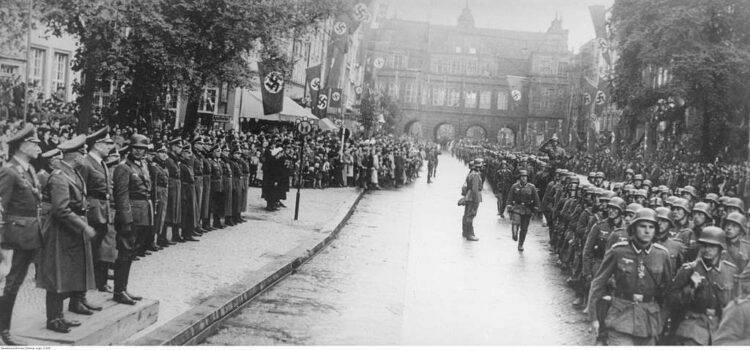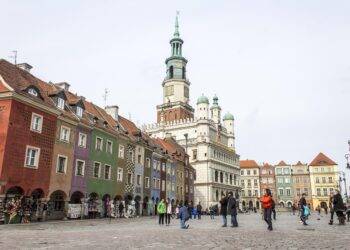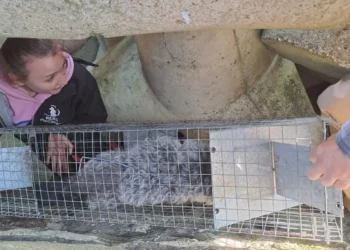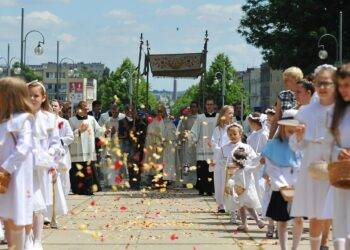During the St. Dominic Fair in Gdańsk (Polish: Jarmark Św. Dominika or Jarmark Dominikański), a group of German musicians performed a song that was highly popular among Wehrmacht soldiers. The fair organizers addressed the issue, stating that the band “was not aware of its unequivocally negative connotation in Poland.”
- More News from Poland on our Homepage.
- Sign up to our Newsletter to receive a weekly recap and stay informed about current events in Poland
- Don’t forget to follow us on Facebook.
The St. Dominic Fair is a recurring event held in Gdansk in late July and August. This year’s edition gained attention due to the performance of the song “Ein Heller und ein Batzen,” also known as “Heili, Hailo, Heila,” by German musicians dressed in traditional costumes at Swietopelk Square.
Local media, which first reported on the issue, emphasized that the song was highly popular among Wehrmacht, the Nazi army during WWII.
“While we pay tribute to the victims of the Wola Massacre in Warsaw, one of the Wehrmacht hymns from the time of World War II echoes in Gdansk during a mass event organized by the Gdansk municipality,” reads a tweet from the Gdansk Prestige Zone account.
Gdańsk is a city where the WWII started. On September 1, the first German attack of the war came against the Polish defenses at Westerplatte, a peninsula in the Bay of Gdańsk
Apologies from Germans
The fair organizers commented on the matter, stating that the song was performed by a folk group from Franconia, and the musicians “were not aware of its unequivocally negative connotation in Poland.”
“The folk group, which came with the official delegation from Central Franconia and promoted traditional products at the St. Dominic Fair, performed it in the original folk version from the 19th century and was unaware of its unequivocally negative connotation in Poland. We have drawn attention to the inappropriateness of such behavior. We apologize for the situation that arose. It is worth emphasizing that the Central Franconia delegation began their visit to Pomerania by laying a wreath at the Defenders of the Coast monument on Westerplatte,” they reported.
It is worth noting that although this song is regarded in Poland as an unofficial Wehrmacht soldiers’ hymn, it was not specifically written for this formation.
Its lyrics were composed back in 1830 by Albert Ernst Ludwig Karl Graf von Schlippenbach. During that time, it was a folk song with a festive character.
A statement regarding the incident was also issued by the Gdansk International Fair, the organizers of the fair. It stated that the German delegation apologized for their performance.
“The City of Gdansk and the Gdansk International Fair accept the apologies made by the German delegation following the performance of the folk group representing the Central Franconia district. The German region ‘regrets the situation’ and explains that they ‘did not intend to offend anyone’. (…) During the St. Dominic Fair, over 60 artistic events take place. The organizers coordinate performances on the main stage, but they have no control over the songs sung in various areas of the fair, as was the case in the aforementioned incident,” it read.
“What contempt these people have for us”
However, the matter did not end there. The behavior of the Germans was commented upon by Arkadiusz Mularczyk, the Deputy Minister of Foreign Affairs and Government Plenipotentiary for War Reparations.
“Wehrmacht songs at the fair in Gdansk. It’s like playing Wagner’s music in front of the Wall of Tears. Exceptional insolence. Complete insensitivity and ignorance of the realities of World War II. Unfortunately, the praise for German revisionism is re-emerging before our eyes,” the politician wrote on social media.
Gdansk PiS (Law and Justice) MP Kacper Płażynski also voiced his opinion on the matter. “Germans come to the Gdansk St. Dominic Fair and sing the most famous triumphant marching song of the Wehrmacht, with altered lyrics to include ‘hailing.’ They will probably burst with pride at home. What contempt these people have for us, the descendants of the victims,” he stated.
Later, in an interview with PolskieRadio24.pl, he suggested that the Polish Ministry of Foreign Affairs should summon the German ambassador. “I would advise the Ministry of Foreign Affairs to summon the German ambassador to clarify whether such an attitude towards Poland is widespread in Germany,” he remarked.
I don’t believe they didn’t know what they were singing. After all, they sang the altered Wehrmacht song that includes the ‘hailing.’ It is clearly audible in the recording. I think it shows their extraordinary contempt for us. When they return to their country, they will tell their German colleagues: we were in Gdansk, in our Gdansk, our beloved homeland, and we sung to the Poles what we think of them. We remember our soldiers from the Wehrmacht,” he added.
- Thank you for reading the article – we’re glad you are with us.
- Follow us on Facebook and Twitter to stay up to date with News from Poland.
- For the most beautiful pictures of Poland – follow us on Instagram.


















